

I often ask myself if that is the result of seeing people lose their humanity, and therefore I wonder what can be done to help us regain our humanity or learn how to truly empathize. As a true believer in the role of the educator as an agent of change, I have been wondering whether it is possible for literary fiction to allow readers to approach the characters’ reality and walk a mile in their shoes. Recent research shows that literary fiction improves empathy, but how can we promote that more deliberately in the classroom? In pursuit of an answer, I have been experimenting with literary circles and other extensive reading activities in the English classroom. In this talk, I will share some of my experiences and discuss possibilities for implementing such activities in different contexts and using different kinds of materials. We will consider the use of graded readers and unabridged literary works of several genres. We will consider different teaching contexts and levels of proficiency as well.
676ff59b09b7482f conceptanalysisofempathy. RSA Shorts - The Power of Empathy. Empathy Is Tough to Teach, But Is One Of the Most Important Life Lessons. Dr.
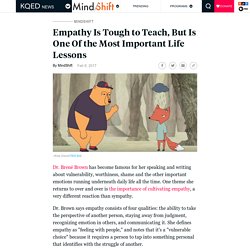
Brené Brown has become famous for her speaking and writing about vulnerability, worthiness, shame and the other important emotions running underneath daily life all the time. One theme she returns to over and over is the importance of cultivating empathy, a very different reaction than sympathy. Dr. Brown says empathy consists of four qualities: the ability to take the perspective of another person, staying away from judgment, recognizing emotion in others, and communicating it. Literature and Empathy. Vozes Especial: O Poder Da Empatia Vozes: Histórias E Reflexões podcast. Chimamanda Adichie: The danger of a single story. If a story moves you, act on it. A Thousand and One Books. Empathetic vs. Sympathetic vs. Empathic. Empathy vs. Sympathy—Learn the Difference.
Empathy is a term we use for the ability to understand other people’s feelings as if we were having them ourselves.Empathy can also mean projecting our own feeling onto a work of art or another object.Sympathy refers to the ability to take part in someone else’s feelings, mostly by feeling sorrowful about their misfortune.Sympathy can also be used in relation to opinions and taste, like when you say that you have sympathy for a political cause.
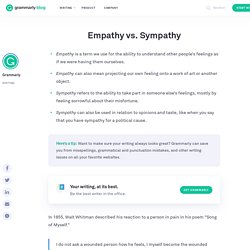
Here’s a tip: Want to make sure your writing always looks great? Grammarly can save you from misspellings, grammatical and punctuation mistakes, and other writing issues on all your favorite websites. Your writing, at its best. Be the best writer in the office. Get Grammarly. Inspiring empathy through reading. Novel Finding: Reading Literary Fiction Improves Empathy. How important is reading fiction in socializing school children?
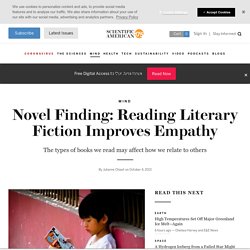
Researchers at The New School in New York City have found evidence that literary fiction improves a reader’s capacity to understand what others are thinking and feeling. Emanuele Castano, a social psychologist, along with PhD candidate David Kidd conducted five studies in which they divided a varying number of participants (ranging from 86 to 356) and gave them different reading assignments: excerpts from genre (or popular) fiction, literary fiction, nonfiction or nothing. After they finished the excerpts the participants took a test that measured their ability to infer and understand other people’s thoughts and emotions. The researchers found, to their surprise, a significant difference between the literary- and genre-fiction readers. When study participants read non-fiction or nothing, their results were unimpressive. Literary fiction, by contrast, focuses more on the psychology of characters and their relationships.
The Importance of Reading Fiction - The Mission - Medium. I am going to begin this article by posing an argument: reading fiction is important.

Everyone can agree that reading is an important component in developing a successful life. Consuming content sharpens your intellect and builds your knowledge set. It seems almost universal that the more successful you are, the more you read. But this focus on reading is one-dimensional. People get caught up in nonfiction — self-help books, business books, books on sales and health and psychology and relationships. The Surprising Power of Reading Fiction: 9 Benefits.
“There is no doubt fiction makes a better job of the truth.” ― Doris Lessing One of the most inspiring perks we’re lucky enough to have at Buffer is a free Kindle for each teammate (and her family!)
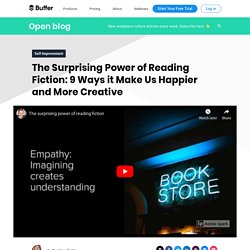
And as many free Kindle books as you like, no questions asked. When we share what we’re reading at Buffer on our Pinterest page or in our Slack community, the selections often tend to skew more toward non-fiction—you can generally find teammates reading books that help us improve at our jobs, understand our world better and become more productive, for example. What’s interesting—and maybe a bit counterintuitive—is that reading fiction can provide many of those same self-improvement benefits, even while exploring other worlds through stories that exist only in the mind. In fact, the practice of using books, poetry and other written words as a form of therapy has helped humans for centuries.
Why Do We Read Fiction? Here Are 5 Reasons. My favorite authors are those who obviously care about their readers.
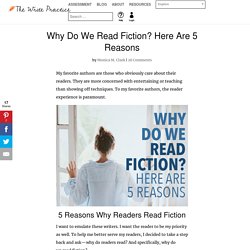
They are more concerned with entertaining or teaching than showing off techniques. To my favorite authors, the reader experience is paramount. 5 Reasons Why Readers Read Fiction I want to emulate these writers. I want the reader to be my priority as well. The Surprising Power of Reading Fiction: 9 Benefits. 7 Benefits Of Reading Literary Fiction You May Not Know. Your mind is the most powerful tool you have for the creation of good in your life, but if not used correctly, can also be the most destructive force in your life.

Your mind, more specifically, your thoughts, affect your perception and therefore, your interpretation of reality. (And here’s Why Your Perception Is Your Reality.) I have heard that the average person thinks around 70,000 thoughts a day. That’s a lot, especially if they are unproductive, self-abusive and just a general waste of energy.
You can let your thoughts run amok, but why would you? Choose to be the person who is actively, consciously thinking your thoughts. Culture - The best way to understand ourselves? A man talking to a skull.
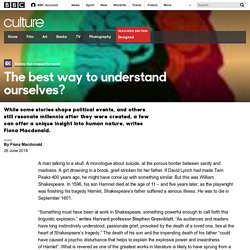
A monologue about suicide, at the porous border between sanity and madness. A girl drowning in a brook, grief-stricken for her father. If David Lynch had made Twin Peaks 400 years ago, he might have come up with something similar. But this was William Shakespeare. In 1596, his son Hamnet died at the age of 11 – and five years later, as the playwright was finishing his tragedy Hamlet, Shakespeare’s father suffered a serious illness.
“Something must have been at work in Shakespeare, something powerful enough to call forth this linguistic explosion,” writes Harvard professor Stephen Greenblatt. Want to Be More Empathetic? Start Reading Books by Minorities.